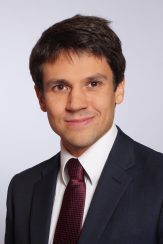WEISS, Tobias

- Name
- WEISS, Tobias
- Job Title
- Associate Professor
- Teaching Area
- Political Sociology, Field Theory, Japanese Studies, Journalism, Civil Society, Social Movements
- Carrier Summary
Tobias Weiss studied Japanese Studies, Chinese Studies and Economics at the Universities of Hamburg and Fukui. He finished his PhD thesis on journalism and the reporting on nuclear power in Japanese media at the University of Zurich in 2018. After research stays at the German Institute of Japanese Studies (2015), Harvard University (2016) and Waseda University (2017, 2019-2020) he became assistant professor (akademischer Mitarbeiter) at Heidelberg University in 2020 and was appointed associate professor at the Faculty of Global Studies at Sophia University in 2022.
- Rooms/Office Hours
2-622 Wed. 16:00~17:00 or by appointment
- Message to Students
In his first book (Nomos, 2019, in German) he explores the reasons for the favorable portrayal of nuclear power in Japanese media as compared to Germany. He traces how political groups worked to spread their preferred framing of nuclear power in the media and how these efforts were successful to different degrees in different media organizations. The combination of frame analysis, historical analysis and interviews allows for an in-depth analysis of the mechanisms aimed at influencing media reporting by the nuclear industry in Japan as well as their limits. Based on this research, he published English-language articles in Poetics, Journal of Civil Society and Contemporary Japan.
Weiss’ research is based on the field-theoretical framework of Pierre Bourdieu. It aims at analyzing the historical genesis of social movements, as well as institutions connecting these historical legacies to the present. Weiss has conducted research on civil society and political groups advocating for and against the use of nuclear power in Japan. He has published articles in the Journal of Civil Society and Social Science Japan Journal looking at the role of conservative and state-sponsored movements in the structuring of Japan’s civil society.
He is also interested in Japanese political culture and in this context has conducted research on the reception of Max Weber in Japan and the resulting analyses of political culture by Maruyama Masao and the modernist school of Political Science in Japan. An article on this topic was published in Asiatische Studien.
Born and raised in Germany he has pursued research on Japanese society with the understanding that studying societies and cultures different from one’s own enables us to change our point of view and work towards gaining insights of universal value.

